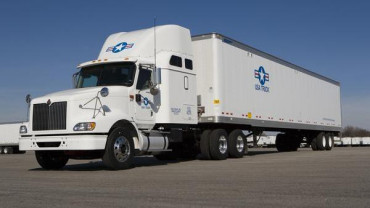Staying ahead of the inspectors 2

the biggest single contributor to the Motor Carrier Management Information System database that underpins CSA, accounting for on the order of 70-plus percent of the total violations contained therein.
While you can’t influence how bad a roadside or weigh-station inspector’s day has been before you see him, you can make the inspection easy by not taking any chance on whether your rig will pass muster.
These following Overdrive articles offer tips on maintenance of lights, brakes and other common areas of equipment failure and inspectors’ priority. Use these resources as you need them to help prepare yourself for the road ahead.
Tires and brakes
Keeping brake adjusters in their groove
Auto-slacks: To adjust or not to adjust?
Tread pattern, compounding, maintenance considerations in-depth
The skinny on maintaining brakes to reduce cost, downtime
Data underlies benefits of low-rolling-resistance tires
Tire spec’ing, retreading for life-cycle cost containment
CCJ air-brake ebook
How-to: Build a closed greasing system
How-to: Replacing brake linings and more
How-to: DIY tire maintenance
CSA and Tire Basics
Spec’ing tires
Preventing tire/brake failure
Avoiding top tire killers
CSA and tire basics
Tire pressure and load
Lights and electrical systems
The long and short on advancements in AGM batteries
Using solar to protect batteries, reduce idling
Inexpensive fix for more secure trailer-pigtail connection
Combating heat’s toll on your batteries
When your dead starter is really a bad cable: Modern electrical system PM
Test-driving a pair of LED headlamps
LEDs for long lamp life
Lighting plug and socket PM
How-to: Aim headlights for enhanced visibility
Electrical system PM
How-to: Maintain fuses
How-to: Maintain batteries
How-to: Replace alternator
Preventing battery drain
Preventing power divider failure
How-to: Upgrade headlamps for longevity
Power- and drivetrain
Understanding your engine’s warning-lamp language
What’s to know about downspeeding engines in combo with the right transmission
PM fringe benefits: Long miles to overhaul or repower
Engine tinkerers, beware: Ins and outs of ECM retunes
How-to: Extend oil drain intervals safely
New oils hit the market in December 2016: Know what you’re buying
Liner protrustion and why it’s critical
An alternative to the standard dyno
Preventive maintenance pointers
How-to: Save the turbo with clean oil, good driving habits
Crankshaft damper PM
Torque ratings and maintenance/economy
How-to: Transmission and axle PM
2010 engines
How-to: Change oil
Synthetic oil
Overhauling the engine
Oil viscosity
How-to: Maintain steering
Air system
Winter pre: Air dryer maintenance
How-to: Detect air leaks
Preventing air pressure loss
How-to: Replace gladhand seals
Trailers and other topics
Fuel additives — efficacy, trends — at the pump and away
Alternative climate control custom option has heat, too
Cost-effective APU alternative for A/C
Next-gen oil bypass filtration and fuel additives
Preventing convex mirror cracks in winter
Primer on trailer PM
PM and inspection tips for suspension, steering components
Spring cleaning: Extra steps to effectively remove road salt to prevent corrosion
Using your reefer unit and separate condenser for cool cab air
Alternative to greasing hood supports: Old socks
How-to: Build custom walk-in storage at front of a dry van
Broken leaf spring: Lessons from the pothole that swallowed my truck
Don’t neglect lonely lube points
Invest in equipment inspections now to save money, hassle later
Emissions systems: Don’t ‘drive through the lights’
Wiper assemblies, blade maintenance
Emissions systems: Newer trucks’ potential handicap
The high cost of emissions-system maintenance
Custom-designed dump trailer for bulk application
Hoses and belts: Avoiding premature failure, maximizing life
9 maintenance items many owner-operators don’t have
How-to: Maintain suspension
Proper DPF care
How-to: Maintain landing gear
How-to: Beat corrosion
Spec’ing trailers for durability
How-to: Service reefer unit
Preventing broken belts/clamps/hoses
